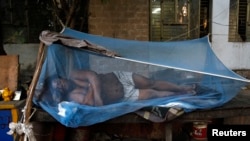ST. LOUIS, MISSOURI —
Irrigation can make a big difference in agricultural production and in the lives of farm families. But the artificial application of water may not all be for the better. A new study describes how irrigation can lead to a surge in malaria that can persist for a decade or more.
The malaria parasite is spread by mosquitoes, and mosquitoes like to breed in standing water. So when a previously dry area is irrigated, the disease can take hold.
“What happens is that when you irrigate, there is more, in a sense, more breeding habitats for the mosquito,” explains University of Michigan scientist Mercedes Pascual. She and her colleagues studied areas in northern India’s Gujarat state, where irrigation was introduced at various times. They analyzed how malaria progressed along with the spread of irrigation.
What they found was that after farmers began irrigating their crops, the malaria risk increased dramatically. The researchers thought maybe the malaria cases surged because there was little effort to control the mosquitoes that spread the disease.
“In fact, we saw the opposite,” Pascual said in a telephone interview. “This transition stage was characterized not just by heightened malaria risk, but also by more intervention to control the mosquito vector.”
Eventually, the mosquito control efforts take hold, but the researchers found high rates of malaria persist for a decade or more - longer than had been previously thought.
Pascual suggests that the irrigation project managers need to focus more on reducing places where mosquitoes might breed. And health officials may need to ramp up their approach, which she says has mostly focused on indoor insecticide spraying.
“And what we are saying is that those measures have to be sustained, and sustained and also planned for, for the long term.”
In areas with low rainfall, the researchers write in their research paper, “irrigation offers considerable rewards.” But as University of Michigan scientist Mercedes Pascual and her team point out, irrigation can also bring with it years of high rates of malaria unless better planning and control measures come along with the water supply.
Their findings are published online by the Proceedings of the National Academy of Sciences.
The malaria parasite is spread by mosquitoes, and mosquitoes like to breed in standing water. So when a previously dry area is irrigated, the disease can take hold.
“What happens is that when you irrigate, there is more, in a sense, more breeding habitats for the mosquito,” explains University of Michigan scientist Mercedes Pascual. She and her colleagues studied areas in northern India’s Gujarat state, where irrigation was introduced at various times. They analyzed how malaria progressed along with the spread of irrigation.
What they found was that after farmers began irrigating their crops, the malaria risk increased dramatically. The researchers thought maybe the malaria cases surged because there was little effort to control the mosquitoes that spread the disease.
“In fact, we saw the opposite,” Pascual said in a telephone interview. “This transition stage was characterized not just by heightened malaria risk, but also by more intervention to control the mosquito vector.”
Eventually, the mosquito control efforts take hold, but the researchers found high rates of malaria persist for a decade or more - longer than had been previously thought.
Pascual suggests that the irrigation project managers need to focus more on reducing places where mosquitoes might breed. And health officials may need to ramp up their approach, which she says has mostly focused on indoor insecticide spraying.
“And what we are saying is that those measures have to be sustained, and sustained and also planned for, for the long term.”
In areas with low rainfall, the researchers write in their research paper, “irrigation offers considerable rewards.” But as University of Michigan scientist Mercedes Pascual and her team point out, irrigation can also bring with it years of high rates of malaria unless better planning and control measures come along with the water supply.
Their findings are published online by the Proceedings of the National Academy of Sciences.











